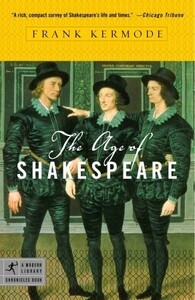Take a photo of a barcode or cover
There were so many big words that I kept having to stop and google because I was struggling to understand them even in context. This read more like a text book than an interesting book giving context to Shakespeare's time. I am a well read person, and I like non-fiction, but I think if you write your book like only other historians are going to read it, then you are going to lose a huge percentage of a potential audience. Having to stop several times a paragraph to look up words I had never heard before took me out of the book and I kept forgetting what I was supposed to be learning. I wish some of the words had been a little easier because the ideas that I was able to glean from the book were interesting.
My Book Blog --------> http://allthebookblognamesaretaken.blogspot.com/
Quite a bit of information packed into such a short text. I was expecting more of an overview/introduction into England at the time of Shakespeare. While it did give that certainly, the text also mainly focused on the plays themselves, and how they related to life in England at the time, under both Elizabeth and James. It's broken up into different stages in Shakespeare's life and looks at the culture and climate of (mainly) London at the time. An interesting little read and for once even though it was not what I expected, it still held my attention.
Quite a bit of information packed into such a short text. I was expecting more of an overview/introduction into England at the time of Shakespeare. While it did give that certainly, the text also mainly focused on the plays themselves, and how they related to life in England at the time, under both Elizabeth and James. It's broken up into different stages in Shakespeare's life and looks at the culture and climate of (mainly) London at the time. An interesting little read and for once even though it was not what I expected, it still held my attention.
I found this a very satisfying little book. It takes a very panoramic look at the late Elizabethan/ Early Jacobean era using the progress of the theater and Shakespeare's company in its iterations as a focusing lens for the time. I've read the biographical stuff, and a good bit of the peripheral history of his contemporaries and incidental characters in his life, the career history, and of course, the popular critical stuff, and "The Shakespeare Wars" but Kermode supplies a missing element I found. It is a sweeping, albeit, brief, tie to the history of the realm and the development of the theater in England, and of The Globe and the Blackfriars theater, in particular, that harmonizes all the rest.
I decided to prepare for a weekend in Stratford-upon-Avon where I am going to see 'Macbeth' with Christopher Eccleston by reading 'The Age of Shakespeare'.
It's a well-written introduction to the context - historical, cultural and social - in which Shakespeare operated, although Shakespearian scholarship might have impacted on some of his conclusions since this was written in 2005.
This is almost the first book I've read about Shakespeare that doesn't complain about the lack of information there is about his life and it doesn't bother to toy with the idea that Shakespeare didn't write his own plays. Indeed, without mentioning it at all Kermode puts together an impressive case for why only Shakespeare could have written them.
Kermode also does a survey of all the plays, which I found interesting, giving background and context to some of the themes and tracing Shakespeare's development as a writer.
There are almost certainly more in-depth books about subjects covered in this book but there aren't many to equal it in terms of compactness of information.
It's a well-written introduction to the context - historical, cultural and social - in which Shakespeare operated, although Shakespearian scholarship might have impacted on some of his conclusions since this was written in 2005.
This is almost the first book I've read about Shakespeare that doesn't complain about the lack of information there is about his life and it doesn't bother to toy with the idea that Shakespeare didn't write his own plays. Indeed, without mentioning it at all Kermode puts together an impressive case for why only Shakespeare could have written them.
Kermode also does a survey of all the plays, which I found interesting, giving background and context to some of the themes and tracing Shakespeare's development as a writer.
There are almost certainly more in-depth books about subjects covered in this book but there aren't many to equal it in terms of compactness of information.
Academic and repetitive in places, this is nonetheless a concise introduction to the plays of Shakespeare in their context.
informative
fast-paced
An excellent short book on Shakespeare and his world by noted critic Frank Kermode (who died earlier this week). It provides background on Shakespeare's life, the theater in Shakespeare's time, and a brief overview of many of his plays -- fit into the context of his artistic development and external circumstances. As could be expected from the author of a book called "Shakespeare's language," it is strong on the language in the plays, how it varies from character to character, the difficulty of differentiating voices in the Roman plays, and the varieties of verse that Shakespeare employed.
Good info on the world at large during this specific time period/person of interest.





